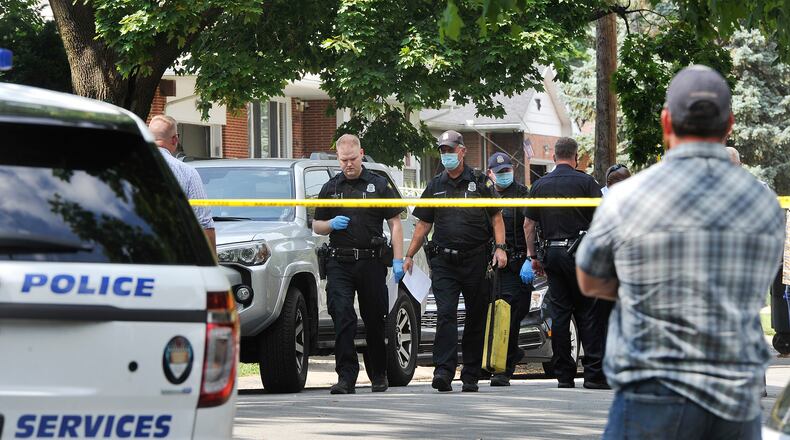Dayton is the largest city in Ohio not to equip officers with body-worn video technology.
Police and city officials in the past have said the cost of the cameras was a primary obstacle, but they also raised concerns about privacy implications and how and when the cameras would be activated and used.
But more recently, equipping officers with body cameras has been viewed somewhat as “low-hanging fruit” when it comes to police reforms, since Dayton police officials, the police union and many citizens and community activists support the move.
Police officials have said they believe the cameras would improve transparency and provide additional evidence in criminal cases.
Some people believe they can reduce civilian complaints against police officers. Others say video can show whether or not officers acted appropriately during encounters and interactions with citizens.
Dayton faces some budget challenges in 2021, primarily because of large revenue declines due to COVID-19.
But Dayton Mayor Nan Whaley said she thinks the city is going to have to find the money to invest in the technology.
“You wouldn’t send an officer out without their uniform and pistol, and I don’t think we should be sending them out without body cameras either,” she said.
On Thursday, all 15 voting members of the use-of-force working group endorsed the idea of Dayton pursuing body cameras.
Dayton City Commissioner Jeff Mims Jr., co-lead of the use-of-force committee, will craft a memo to the city commission asking his colleagues to consider the committee’s recommendation.
The working group should receive a response from the commission that will address next steps, staff say.
Voting members included wide range of community members, including faith leaders, activists and representatives from the Montgomery County Public Defender’s Office and Dayton Police Department.
Body cameras for officers has been one of the main topics of discussion, and based on committee members’ research and experience, the group decided this was an issue that could be handled immediately, said Willis Blackshear Jr., co-lead of the group.
“The universal support came from us all agreeing that body cameras will increase public confidence and allow for more accountability in terms of policing in our community,” he said.
Dayton’s police union, the Dayton Fraternal Order of Police Lodge No. 44, previously has said it welcomes adoption of the technology, because cameras are a “fact-gathering tool” that could increase transparency and promote stronger community partnerships.
The city commission is expected to respond within 30 days of receiving recommendations for reforms,
The commission can either approve or reject the recommendation or ask for more information, staff said. If the recommendation is approved, city staff will be directed to implement the changes in a “reasonable” time frame.
Body cameras, supporters say, can increase confidence in law enforcement, because they document interactions that can confirm or disprove citizens’ or officers’ accounts.
Whaley said body cameras improve transparency and improve trust between officers and the community, which is important.
She said the city hasn’t invested in body cameras before now because it used to be more expensive, the technology wasn’t as good as it is now and there wasn’t a strong demand from community members.
She said she hopes body camera equipment will be included in next year’s budget.
The use-of-force committee also recommended the police department produce an annual use-of-force report, though committee members are still discussing what data should be included.
Whaley announced the creation of the five police reform working groups on June 3, days after there were large protests in the city against police misconduct and racial injustice sparked by the death of George Floyd.
The five committees have met 18 times since July 1, and more than 125 people have been involved in the process.
The working groups are expected to study five focus areas and make recommendations for reforms to city leadership.
The oversight working group has reviewed the current complaint process and reviewed processes in other cities, said Will Smith, who has been hired by the city to act as a consultant and “bridge” between the groups and the community.
“Working group members are wrestling with how to improve community awareness of the complaint process, how to ease the process, as well as alternative review possibilities,” Smith said.
The training group has looked at current requirements for police recruits, discussed how to get more community feedback and debated what officers are taught in their training versus what they learn from personal experience and doing the job, he said.
The recruitment group has reviewed the current hiring and application process and started discussing ideas for increasing diversity and how to improve recruitment opportunities, Smith said.
The community engagement group has had a different kind of conversation than its counterparts, with members talking about current engagement levels and what it will take to reach more people, he said.
Every group is in a different place when it comes to developing recommendations, but they are all making progress, Smith said.
“It seems right now we have that base level of knowledge, we’re getting to what we need to know,” Smith said. “You can see conversations shift into, ’OK, I see what’s going on, I see what I like, I see what I don’t like, and I see where there’s maybe room for change.’”
About the Author



